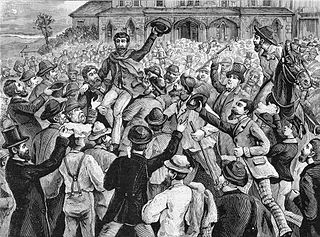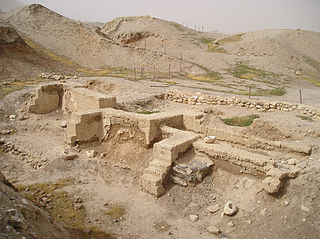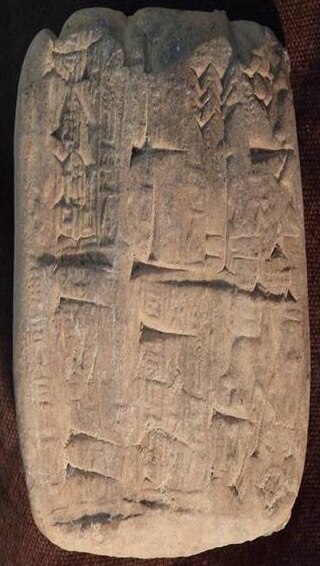Related Research Articles
In jurisprudence, double jeopardy is a procedural defence that prevents an accused person from being tried again on the same charges following an acquittal or conviction and in rare cases prosecutorial and/or judge misconduct in the same jurisdiction. Double jeopardy is a common concept in criminal law - in civil law, a similar concept is that of res judicata. The double jeopardy protection in criminal prosecutions only bars an identical prosecution for the same offence, however, a different offence may be charged on identical evidence at a second trial. Res judicata protection is stronger - it precludes any causes of action or claims that arise from a previously litigated subject matter.

The Dead Sea Scrolls, also called the Qumran Caves Scrolls, are a set of ancient Jewish manuscripts from the Second Temple period. They were discovered over a period of 10 years, between 1946 and 1956, at the Qumran Caves near Ein Feshkha in the West Bank, on the northern shore of the Dead Sea. Dating from the 3rd century BCE to the 1st century CE, the Dead Sea Scrolls include the oldest surviving manuscripts of entire books later included in the biblical canons, along with extra-biblical and deuterocanonical manuscripts from late Second Temple Judaism. At the same time, they cast new light on the emergence of Christianity and of Rabbinic Judaism. Almost all of the 15,000 scrolls and scroll fragments are held in the Shrine of the Book at the Israel Museum, located in the city of Jerusalem. The Israeli government's custody of the Dead Sea Scrolls is disputed by Jordan and the Palestinian Authority on territorial, legal, and humanitarian grounds—they were mostly discovered following the Jordanian annexation of the West Bank and were acquired by Israel after Jordan lost the 1967 Arab–Israeli War—whilst Israel's claims are primarily based on historical and religious grounds, given their significance in Jewish history and in the heritage of Judaism.

In common law jurisdictions, an acquittal means that the prosecution has failed to prove that the accused is guilty beyond a reasonable doubt of the charge presented. It certifies that the accused is free from the charge of an offense, as far as criminal law is concerned. The finality of an acquittal is dependent on the jurisdiction. In some countries, such as the United States, an acquittal prohibits the retrial of the accused for the same offense, even if new evidence surfaces that further implicates the accused. The effect of an acquittal on criminal proceedings is the same whether it results from a jury verdict or results from the operation of some other rule that discharges the accused. In other countries, like Australia and the UK, the prosecuting authority may appeal an acquittal similar to how a defendant may appeal a conviction — but usually only if new and compelling evidence comes to light or the accused has interfered with or intimidated a juror or witness.

The James Ossuary is a 1st-century limestone box that was used for containing the bones of the dead. An Aramaic inscription meaning "Jacob (James), son of Joseph, brother of Jesus" is cut into one side of the box. The ossuary attracted scholarly attention due to its apparent association with the Christian holy family.
The Jehoash Inscription is the name of a controversial artifact rumored to have surfaced in a construction site or Muslim cemetery near the Temple Mount of Jerusalem in 2001.
Oded Golan is an Israeli engineer, entrepreneur, and antiquities collector. He owns one of the largest collections of Biblical archaeology in the world.

Biblical archaeology is an academic school and a subset of Biblical studies and Levantine archaeology. Biblical archaeology studies archaeological sites from the Ancient Near East and especially the Holy Land, from biblical times.

Ronald Eldon Wyatt, an American nurse anesthetist, not a professionally trained archeologist, claimed the Durupınar site in Turkey is the landing place of Noah's Ark, and said that he had made almost 100 other biblical discoveries.

The Israel Antiquities Authority is an independent Israeli governmental authority responsible for enforcing the 1978 Law of Antiquities. The IAA regulates excavation and conservation, and promotes research. The Director-General is Mr. Eli Escusido, and its offices are housed in the Rockefeller Museum.
Shlomo Moussaieff was an Israeli jeweler, of Bukharan Jewish descent. He was the grandson of the gemstone trader Rabbi Moussaieff from Uzbekistan. Founder of Moussaieff Jewellers Ltd., he and his wife Alisa were ranked No. 315 on the Sunday Times Rich List 2011, with a fortune estimated at £220 million. In addition, he was regarded as one of the world's top private collectors of antiquities associated with the Bible and ancient Near East, with a collection of 60,000 artefacts.
The Biblical Archaeology Society was established in 1974 by American lawyer Hershel Shanks, as a non-sectarian organisation that supports and promotes biblical archaeology. Its current publications include the Biblical Archaeology Review, whilst previously circulating the Bible Review (1985–2005) and Archaeology Odyssey (1998–2006). The Biblical Archaeology Society also publishes books about biblical archaeology aimed at a general readership. The Society has, for more than 45 years, run seminars and tours offering an opportunity to learn directly from world-renowned archaeologists and scholars. It also produced videos (DVD) and CDs on archaeology and biblical archaeology.

Levantine archaeology is the archaeological study of the Levant. It is also known as Syro-Palestinian archaeology or Palestinian archaeology. Besides its importance to the discipline of Biblical archaeology, the Levant is highly important when forming an understanding of the history of the earliest peoples of the Stone Age.
The Double Jeopardy Clause of the Fifth Amendment to the United States Constitution provides: "[N]or shall any person be subject for the same offence to be twice put in jeopardy of life or limb..." The four essential protections included are prohibitions against, for the same offense:

The ivory pomegranate or Jerusalem Pomegranate is a thumb-sized ornamental artifact acquired by the Israel Museum. It is not actually made of ivory, but of hippopotamus bone and bears an inscription; Holy (Sacred) to the Priest of the House of God (YHWH).
King Ahaz's seal is a bulla originating from the 8th century BCE. The place of discovery of this seal is unknown, and it is currently part of Shlomo Moussaieff's private collection. The seal contains an ancient Hebrew inscription mentioning the name of Ahaz of Judah, as well as the name of his father, Jotham (Jotham), identifying Ahaz as the "king of Judah". The bulla contains a fingerprint which may belong to Ahaz himself.

Prof. Christopher A. Rollston is a scholar of the ancient Near East, specializing in Hebrew Bible, Greek New Testament, Old Testament Apocrypha, Northwest Semitic literature, epigraphy and paleography.
The Antiquities Law of the State of Israel of 1978 was put in place by Israel to eliminate the problem of illegal activities with artifacts. It serves the purpose of describing the rights and obligations regarding the discovery and ownership of ancient coins or other antiquities in Israel, and the possibility of export of these antiquities. The punishment for breaking this law includes imprisonment for a term of two years or a fine of 100,000 pounds. It nationalized antiquities as an attempt to protect them.

Several kinds of archaeological remnants of the Jerusalem Temple exist. Those for what is customarily called Solomon's Temple are indirect and some are challenged. There is extensive physical evidence for the temple called the Second Temple that was built by returning exiles around 516 BCE and stood until its destruction by Rome in the year 70 CE. There is limited physical evidence of Solomon's Temple, although it is still widely accepted to have existed.

The Hobby Lobby smuggling scandal started in 2009 when representatives of the Hobby Lobby chain of craft stores received a large number of clay bullae and tablets originating in the ancient Near East. The artifacts were intended for the Museum of the Bible, funded by the Evangelical Christian Green family, which owns the Oklahoma-based chain. Internal staff had warned superiors that the items had dubious provenance and were potentially looted from Iraq.
References
- ↑ "Robert Deutsch - Academia.edu". Academia.edu. Retrieved 23 April 2024.
- ↑ "Robert Deutsch". Biblical Archaeology Society. Retrieved 23 April 2024.
- ↑ The Associated Press (30 December 2004). "Museums warned about Bible-era fakes". NBC News. Retrieved 23 April 2024.
- ↑ Staff, Biblical Archaeology Society (6 February 2008). "Hershel Shanks: Trial Reaching Climax?". Biblical Archaeology Society. Retrieved 23 April 2024.
- ↑ "החלטה - מדינת ישראל נגד 1. עודד גולן,2. רוברט דויטש,3. רפאל בראון - נמחק,4. שלמה כהן - נמחק,5. פאיז אל עמלה - עניינו הסתיים". Law4All. Archived from the original on 6 March 2019. Retrieved 3 March 2019.
- ↑ Hasson, Nir (30 March 2012). "Israeli antiquities collector talks about his trial – and his acquittal". Haaretz. Retrieved 23 April 2024.
- ↑ Bolen, Todd (14 March 2012). "Not Guilty: James Ossuary Trial Ends". BiblePlaces.com. Retrieved 23 April 2024.
- ↑ Kalman, Matthew (December 2013). "Deutsch Files $3 Million Suit Against Israel Antiquities Authority | Bible Interp". The Bible and Interpretation. University of Arizona . Retrieved 23 April 2024.
- ↑ "Antiques dealer sues Israel for $3 million after being acquitted of forgery charges". Fox News . 25 March 2015. Retrieved 23 April 2024.